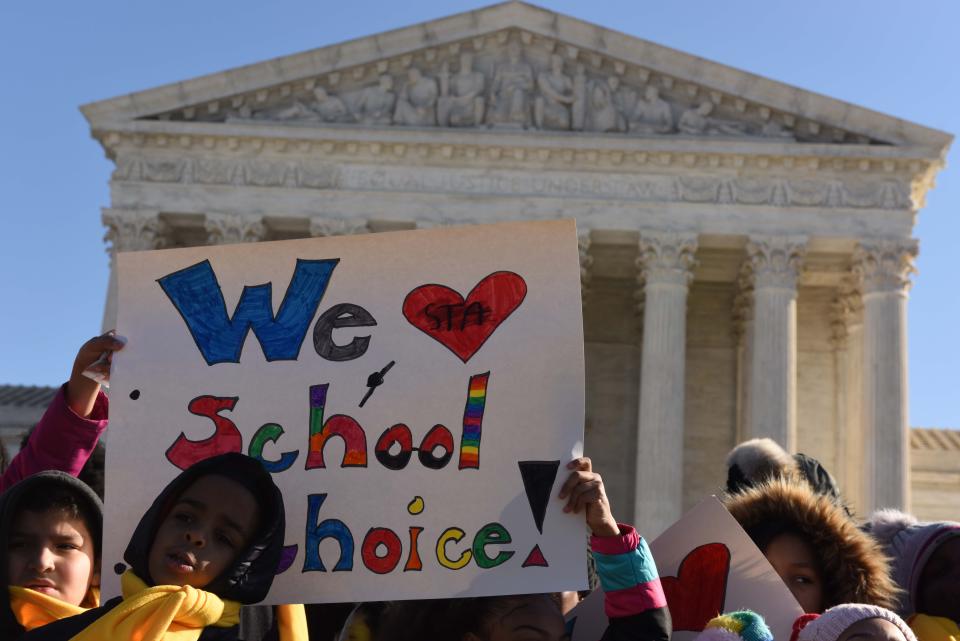School choice is sweeping America. Now, Supreme Court has given parents even more options.
Since COVID-19 emerged in early 2020, families have had their children's education upended.
Many public schools remained shuttered to in-person learning for more than a year, leaving parents with few options – especially if they couldn’t afford private schools that were much more likely to keep their classrooms open during the pandemic.
The frustration that ensued from parents juggling work and their children’s learning, as well as the depression many students suffered while being stuck at home, spurred an explosion of school choice initiatives around the country.
In 2021, more than 20 states created or expanded these programs, including education savings accounts or tax credit scholarship programs that can be used at private schools.
School choice and religious freedom
A new decision by the U.S. Supreme Court will surely add to this momentum. In a 6-3 ruling in Carson v. Makin on Tuesday, the court once again sided strongly with both school choice and religious freedom.
Opinions in your inbox: Get exclusive access to our columnists and the best of our columns every day
This case, out of Maine, had many similarities with the 2020 Espinoza v. Montana Department of Revenue decision. It found that the government could not prevent parents from choosing religious schools within a private educational choice program, and that discrimination based on the faith “status” of a school violates the First Amendment.
Maine had attempted to bypass that ruling by drawing a convoluted distinction between “status” and “use” – saying it didn’t want taxpayer dollars going to religious instruction. The state grants tuition assistance to families who live in rural areas without a public school so students can attend either a nearby district or a private school, but it stopped short of allowing parents to choose sectarian schools.
Since faith-based schools are going to integrate religion into their curriculum, this was a flimsy argument.

"There is nothing neutral about Maine's program,” wrote Chief Justice John Roberts in the majority opinion. “The State pays tuition for certain students at private schools – so long as the schools are not religious. That is discrimination against religion. A State's anti-establishment interest does not justify enactments that exclude some members of the community from an otherwise generally available public benefit because of their religious exercise."
More: Clarence Thomas' principles showcase how he approaches big matters of constitutional law
The Institute for Justice represented the families in the Carson case, as it had in Espinoza.
“(The) decision makes clear, once and for all, that the government may not bar parents from selecting religious schools within educational choice programs, whether because of their religious affiliation or the religious instruction they provide,” said Michael Bindas, a senior attorney with the Institute for Justice, in a statement.
Your move: Teachers like me do anything to protect students
An end to Blaine Amendments?
This will have huge implications around America, as most of the states’ Blaine Amendments, which prevent state dollars from going toward religious schools, will be effectively void. Thirty-seven states have had these antiquated measures on the books, vestiges of 19th century anti-Catholic bigotry.
“This ruling is a huge win for religious freedom and parental rights in education,” Corey DeAngelis, national director of research at the American Federation for Children and an adjunct scholar at the Cato Institute, told me. “The Carson decision deals another major blow to the discriminatory Blaine Amendments found in dozens of state constitutions.”
DeAngelis, noting that school choice support is already at an all-time high, said the ruling should further “supercharge” momentum for more educational choices in the states and embolden state lawmakers to advocate for these options.
Unfortunately, a few states have Blaine Amendments that won’t be affected by the Carson decision. That’s the case in Michigan, which is notorious in the school choice community for the language in its constitution. Rather than calling out religious schools, Michigan law blocks all aid to all nonpublic schools. This has made passing any form of private school assistance impossible, even as its Midwest neighbors have done so.
'I don’t know what to do': A family in need is often just one job loss away
Fund students, not systems
Some groups are still trying. The Michigan-based Mackinac Center Legal Foundation is seeking to overturn the state’s anti-choice amendment and filed a federal lawsuit last year. Even though the amendment’s language is “neutral,” it was enacted with “anti-religious hostility,” according to Patrick Wright, director of the legal foundation. Most of the state’s private schools are faith-based.
Separately, citizen ballot initiative Let MI Kids Learn is underway and could pave the way for a tax-credit scholarship program aimed at helping low-income students or students with special needs attend private schools and access other educational benefits. This effort is backed by former U.S. Education Secretary Betsy DeVos, who is from Michigan, and former Vice President Mike Pence.
Betsy DeVos: Trump’s actions on Jan. 6 were ‘line in the sand’ that led to resignation
In the meantime, Michigan families won't benefit from the high court's ruling. And it’s possible that in the wake of this opinion, some states could consider revising their Blaine Amendments to more closely mirror Michigan’s.

That may not fly with parents. The pandemic taught us that a one-size-fits-all model of education failed too many families, and the Supreme Court is helping break down barriers.
States should take advantage of these new opportunities. As DeAngelis said, “Now is the time for states to go all-in on funding students instead of systems.”
Ingrid Jacques is a columnist at USA TODAY. Contact her at ijacques@usatoday.com or on Twitter: @Ingrid_Jacques
You can read diverse opinions from our Board of Contributors and other writers on the Opinion front page, on Twitter @usatodayopinion and in our daily Opinion newsletter. To respond to a column, submit a comment to letters@usatoday.com.
This article originally appeared on USA TODAY: Supreme Court decision gives parents a win with school choice options

 Yahoo Movies
Yahoo Movies 
